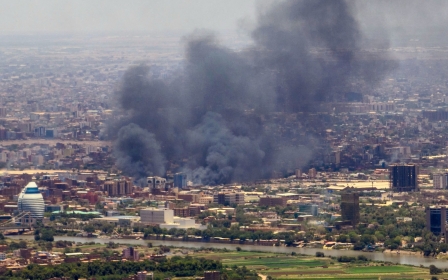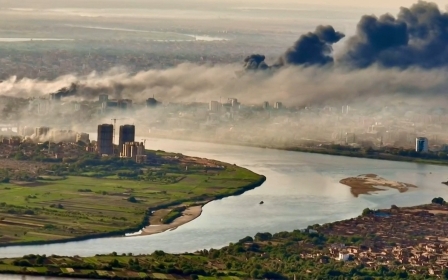Sudan crisis: Warring sides meet in Jeddah as fighting continues
Fighting and air strikes on Khartoum continued on Sunday in Sudan as representatives from the warring parties met in Saudi Arabia for talks to discuss a potential ceasefire.
Multiple ceasefires have been broken and not respected since a violent war broke out between the Sudanese Army and the paramilitary Rapid Support Forces (RSF).
The Sudanese Doctors Union said the fighting had killed at least 700 people, many of whom are civilians, wounded thousands and led to millions of Sudanese and foreigners fleeing the country.
Many have fled to Chad, Egypt and South Sudan for safety, while others fled to Port Sudan and were then taken across the Red Sea to Saudi Arabia.
In Khartoum, residents remain trapped in their homes and makeshift shelters with little food, medicine and water as fighter jets pummel the city.
New MEE newsletter: Jerusalem Dispatch
Sign up to get the latest insights and analysis on Israel-Palestine, alongside Turkey Unpacked and other MEE newsletters
Meanwhile, representatives of the warring parties continue to meet in Jeddah to negotiate a humanitarian ceasefire so that aid can be delivered to the besieged population.
But both sides have said little about the progress of their talks since Saturday and blamed each other for breaking previous truces.
Army spokesperson Brigadier General Nabil Abdalla said the talks aimed to discuss how the truce "can be correctly implemented to serve the humanitarian side".
The RSF has not commented on the talks, but its leader, Mohamed Hamdan Dagalo, said he welcomed the discussions.
Saudi Arabia and the United States have supported talks and demanded an end to the conflict.
Fighting began between the army and the RSF after they disagreed on delivering civilian rule in Sudan following the removal of longtime leader Omar Bashir in 2019.
Both sides have attempted to present themselves as protectors of Sudan's democratic values, despite ousting the country's civilian-led transitional government.
Middle East Eye delivers independent and unrivalled coverage and analysis of the Middle East, North Africa and beyond. To learn more about republishing this content and the associated fees, please fill out this form. More about MEE can be found here.




